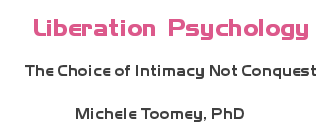Book: Introduction
© 2000 Michele Toomey, PhD
Supposedly, separation of church and state protects our public schools from religious interference and bias. Our fear of losing that protection and therefore, that separation, has led us on a collision path with values. We fear them. They represent religion and the power of religious beliefs. Our fear became so loud in the late '70's that humanism was decried as a religion.
Courses in "values clarification" that had begun to find their way into our schools, were challenged as "too value laden", and were dropped from the curriculum. Even patriotism was suspect, and requiring students to salute the flag or stand to sing the national anthem, ended up in court. Patriotism lost. It was an arbitrary value, not a national one, or so it was concluded.
We became afraid to take a position on where we stood together with shared values, for fear it weakened our individual civil rights. Proclaiming individuality and protecting it, became our national objective. Standing together with hands joined seemed a threat, not a privilege. In my opinion, herein lies one of the major roots of today's alienated and angry undercurrent in our land.
At a time when prosperity is at an all time high, we are passing "hate crime" legislation to try to stop the trend of violence directed against those whose beliefs and life style or race are different from ours. Laws limiting the right to assemble and speak freely have had to be enacted because abortion clinics are being bombed, and doctors who perform abortions are being attacked and sometimes killed. Children are being tried as adults because they are murdering each other, their parents, and their teachers. We are not having psychological prosperity. We are experiencing psychological mayhem.
The very foundation of our country's strength and union, shared beliefs, is being attacked. What we are "against" is louder by far, than what we are "for". Fighting crime, fighting hate, fighting each other, and fighting violence is not the way most of us would want to enter the 21st century. We need to find our inspiration in what we, as a nation believe, in what we stand for, and we need to look in each other's eyes and at each other's faces as we proclaim it. This is not a foreign concept. It is our national heritage.
"We hold these truths to be self-evident, that all men are created equal, that they are endowed by their Creator with certain unalienable Rights, that among these are Life, Liberty and the pursuit of Happiness."
-- Declaration of Independence
Fairness flows from these "rights", so it is not a value that is foreign to us, and we need not fear it. It's what prompted our independence as a nation. No religion owns "fairness" so it's not a church/state issue. If any country has struggled with fairness it's ours. We originally took the land away from Native Americans and today we are still in the process of returning some of it. We enslaved and then freed Black Americans, and today we are confronting ourselves on how that injustice is still haunting us. We originally left female Americans out of the voting process, and after years of challenge, recognized the unfairness of it and gave women the vote. In each case, it was not only their right, it was only fair.
Self-expression with accountability provides us with the vehicle to communicate with psychological fairness. It provides such a fair playing field, our natural fear of revealing how we feel and what we think is reduced to an acceptable level. Self-exposure is cultivated, and therefore, being known and understood is a natural outcome. This in turn allows us to be connected with each other and experience the warmth of connection instead of the coldness of estrangement. If we will travel together and pay attention to the effect our words and actions are having on each other, there will be greater opportunities for generosity of spirit and tolerance for differences. Our civil liberties will be enhanced, not jeopardized, by a climate of integrity and fairness, caring and mutual respect.
I think it is the challenge of our time to dare unite around the value of fairness and to commit to learn and to teach our children to cherish fairness and the accountability it requires.
This book is meant to teach you, the teachers, how to communicate with integrity and fairness, and then how to teach your students to do the same. Regardless of the age level and the subjects you will teach, nothing will have a greater impact on your students' lives than learning how to communicate with integrity and with the fairness and respect that emanate from it. Confrontation and accountability will provide you and your students with an approach and an orientation that guarantees fairness, cultivates understanding, works to address alienation, fosters respectful and caring communication, and reduces violence.
By learning to view the communication of self-expression as an exchange of information that leads to understanding and intimacy, not as a forum to argue one's point or attack and defeat one's opponent, the climate of the school changes. A bond of community and belonging can be created, much as it is traditionally formed around sports teams and events. In this instance, the bond is formed on a personal and individual level. The power of words and the tools for using this power fairly will be presented for your use. |



